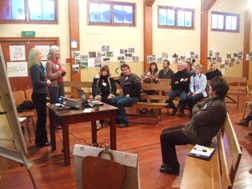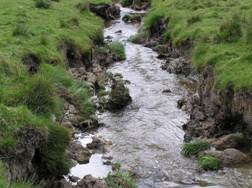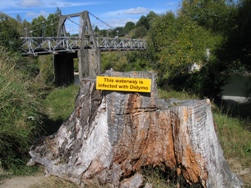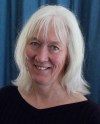Community Resilience – Watershed Talk
Research Status: Ongoing |
Watershed Talk Report Back and Social July 2007 |
Introduction
“Nature in the 21st century will be a nature that we make”
Daniel B Botkin, Discordant Harmonies (1990)
Watershed Talk
When and Why this work was initiated
Watershed Talk is a social science project in the ICM research area Science Responsiveness to the Community. This research area asks
‘What tools and approaches can we use to promote effective interaction between scientists, resource managers, and the community?’. The Watershed Talk project explored processes of dialogue between these groups and examined the impact this can have in shifting people’s understanding and developing their capacity to address the complex environmental issues that they face.
The aim of Watershed Talk was to trial a dialogue process as a way of empowering people with understanding. One of the intentions of the research was to generate insights for more devolved community-based models of environmental decision-making, supported by regional councils. We would expect governance structures and processes to be an important factor in such models.
Watershed Talk builds on the participatory and collaborative success of the art-science project that led to the Travelling River exhibition of 2004-05. This exhibition, explored the science and community connection with the Motueka river catchment and revealed much about the cultural identity with land and river, and the ongoing practices of care for the environment. Hence Watershed Talk began by recognizing that people often have a set of practices or values that underpin wanting to leave the land in better shape (whether it is the people who work and live, who manage or who do science about the place), that they do care about their environment and their community in differing ways, and we can learn how to build more integrated and inclusive responsibility and action.
Research Approach
The project set up two groups of 8, comprising 6 engaged from within the catchment community plus a TDC staff member and a scientist (from the ICM programme) in each group. Group 1 was loosely based around Tapawera and met at the Tapawera Community Centre; Group 2 around Ngatimoti and downstream, meeting at the new rural fire station community facility.
Briefly, the methodology involved preliminary individual interviews where individuals reviewed what they initially felt about care in the catchment and reflected on their existing knowledge of the environment, the people, and the institutions of the area. Before the first meetings group members took photos in the catchment prompted by the question ‘is our catchment being cared for, and how do we recognize that?’,
Meeting 1 involved sharing their photos and discussing their different views. Before the next meeting participants were asked to keep a diary of reflections about ‘what is at the heart of building resilience, and what are we going to do about it?’ These observations were shared at the second group meeting, which then focused on a how they might go about addressing a specific problem. The meetings were followed by individual interviews to debrief on the process and reflect on any shifts in their views about care and responsibility in the catchment.
Finally, the two groups met at a spit roast and pot luck dinner at Ngatimoti Hall where preliminary insights from the work were presented by Margaret and Maggie to group members, and feedback welcomed. Insights from this work have been published in 2009 as a book "Watershed Talk - the cultivation of ideas and action". The principles were also discussed with the Motueka ICM Community Reference Group in August 2009.
The principles and approach of this research are planned to be applied in a project with Tasman District Council and Nelson City Council for long-term management of the Waimea Inlet, Nelson.
A Summary of Who was Involved
The project team comprises social researcher Margaret Kilvington, community and landscape researcher Maggie Atkinson and ICM programme leader Andrew Fenemor. Maggie has convened the groups, Margaret and Maggie have run the meetings and the reporting back, and all three have written the book.
Research Results
The research develops ideas about care and responsibility, explores principle-based design of resilience approaches to problem solving, and documents what makes for good communication and participation.
We identify distinctions between common approaches to problem solving that are often constrained by institutional norms, and processes that promote capacity and develop resilience- (eg. shared leadership, listening for competing views, transdisciplinarity).
Some observations from the process:
Many people are cynical about the lack of care for the environment but the group discussions made people more optimistic and aware of what others were actually doing (e.g. killing Old Mans Beard) and how what they did contributed to the whole .
- Group discussion identified common elements to peoples lives and ideas, and this created a sense of ‘sharing the burden’
- Working well together isn’t so much about having enough information on what to do, but how to organize and mobilize a response to an environmental concern
- The act of meeting together broke down preconceptions because it allowed sharing at a personal level about being a farmer/ local body staff member/scientist etc
- The groups were surprised just how much knowledge is available from everyone, if only it could be shared more - finding information about consequences of actions at a range of scales was felt to be important
- The facilitated group discussion changed participants by shifting stereotypes, building trust of others, and built confidence in asking others for help or information
Implications for Management in the Motueka Catchment and Nationally
Creating opportunities for dialogue - as occurred in this project - builds awareness and commitment for improved environmental management. We think this process builds capacity in the catchment through increased awareness, increased networks and increased confidence and trust amongst participants.
The research offers ideas and a process for councils, community groups, government agencies and facilitators to structure and design community interaction. Not just around environmental issues, but any issues including social and economic ones too.
How to buy the book
"Watershed Talk - the cultivation of ideas and action" is published by Manaaki Whenua Press and available for $20+P/P from www.mwpress.co.nz
Citation:
Atkinson, M; Kilvington, M; Fenemor, A. 2009. Watershed Talk - the cultivation of ideas and action. Manaaki Whenua Press. 45pp.
Manaaki Whenua Press description of the book:
Participation, consultation, engagement; these have been buzzwords for a decade or more. But beneath the clichés many people are asking ‘can we do it better, can we be more effective in mobilising change, and if so, how?’
Watershed Talk is an action research project that distills the ingredients of effective dialogue processes for building community resilience. Conversations that encourage our learning through complex problems will enhance our potential for active citizenship and leadership - the heart of a resilient future. But what would a resilience approach to problem solving look like, compared to traditional approaches?
The Watershed Talk project designed and tested a community dialogue process to answer this question, within an integrated catchment management context. It brought about 20 people together from widely different backgrounds local to New Zealand’s Motueka Valley to investigate existing ethics of care in the catchment and the role of dialogue in empowering action around environmental stewardship. The project included individual interviews, take-home tasks, two group meetings and follow-up interviews. It piloted the use of innovative techniques such as participant photographs to expose ethics of care.
The Watershed Talk publication is a synthesis of learning from the project presented in 6 parts, with a preface by Jo Brosnahan and liberally illustrated with B/W reproductions of photographic images taken by participants.
"The Watershed Talk project provides a model for environmental management, and exploration of common solutions. It is a model for economic development, for communities to explore common futures from which they can all benefit. It is a model for local government, and for those involved in Resource Management Act processes. Most of all however, it is a model for community leadership development; for leadership is the essential ingredient to ensure a positive and exciting future."
Jo Brosnahan, Founding Chair Leadership NZ
 |
 |
Waiwhero stream condition |
Didymo warning |
Recent Publications
Recent Presentations
| Year | Title | File Size |
| 2010 | Resilient Communities, Resilient Ecosystems Learning about Integrated Catchment Management in New Zealand |
|
Primary Contacts:

|
Maggie Atkinson
Email |
Institute The Illustrated Earth |
Expertise Artist participant in Mountains to Sea project; community researcher & facilitator |

|
Andrew Fenemor
Email Phone: 03 545 7710 More details» |
Institute Landcare Research |
Expertise ICM programme management; local liaison; resource management; hydrology and water resource management |

|
Margaret Kilvington
Email Phone: 03 3256700 Fax: 03 3252418 More details» |
Institute Landcare Research |
Expertise collaborative learning, facilitation, evaluation |